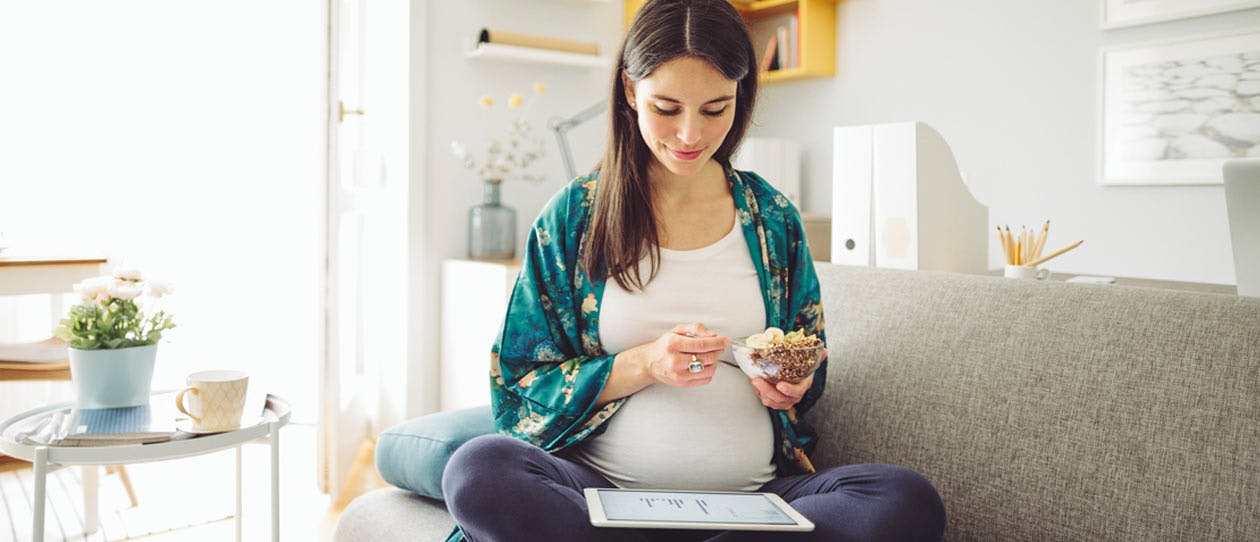Healthy pregnancy snacks
When you’re pregnant, food can consume your thoughts: what you can and can’t eat, how much will keep you full (but not too full), and whether all that sugar in your chocolate doughnut is going directly to the baby. It’s no wonder you’re hungry all the time!
Even though you sometimes feel like you could put away a whole roast chicken, big meals are not always a good idea, says Katie Gregory,
Advisory Naturopath at Blackmores.
“During pregnancy the natural intestinal and stomach rhythm can change, which can make larger meals more difficult to digest,” she says. “Eating big portions can also exacerbate common pregnancy symptoms such as nausea, reflux, low blood sugar levels or fatigue.”
Katie advises choosing small regular meals or snacks, which may take the burden off an overworked digestive system and ease pregnancy discomforts. When it comes to deciding which snacks to go for, she advises that variety is the key.
“Try to include good fats, protein and fibre, and ensure that there is an abundance of vegetables and fruit throughout the day,” she says.
So here’s a snack-sized guide to incorporating protein, fibre, calcium and fats into your diet.
Up your protein in the first two trimesters
“Protein is needed for the healthy growth of the fetus and placenta, and our requirements increase in the first and second trimesters,” Katie explains.
Protein can be found in animal products such as red meat, eggs and fish, as well as plant-based sources like lentils, nuts and seeds.
Healthy protein snacks
- Peanut butter celery sticks
- Hard-boiled eggs
- Wholegrain crackers with nut butter or cheese
- Chopped vegetable sticks with hummus
- Homemade or store-bought protein balls
- Mini quiches or frittatas
Boost fibre to keep things regular
Maintaining good gut health is important, especially for pregnant women who can experience some nasty knock-on effects from reduced fibre intake.
“Fibre rich foods aid healthy digestion which in turn may help to prevent common pregnancy symptoms such as constipation or haemorrhoids,” says Katie.
Fibre can also help keep us fuller for longer (good news for keeping those
pregnancy cravings at bay).
Foods with a good source of fibre include leafy green vegetables (think spinach, kale and swiss chard), legumes, oats, psyllium husks and chia seeds.
These may not be snacks in their own right but can be integrated into other snacks and small meals.
Fibre-rich foods
- Fruit smoothies
- Cereal, muesli or yoghurt sprinkled with bran or psyllium husk
- Oat balls
- Fruit and nut mix
- Roasted chickpeas or pepitas
- Edamame
- Wholegrain crackers with avocado and tuna
Crank up calcium in the third trimester
In pregnancy, particularly in the latter half, calcium requirements increase. The development of fetal bones requires a good amount of calcium, especially in the third trimester.
“When pregnant, if you are not receiving adequate amounts of calcium, the fetus will take calcium from the mother’s bones which can lead to complications such as osteoporosis in the future mum-to-be,” Katie warns.
The recommended daily intake of calcium is 1,000mg, but many of us fall short of this target.
Calcium-rich foods include dairy products such as milk, cheese and yogurt, as well as non-dairy sources such as sardines, tofu and almonds.
Get calcium on-the-go
- Cheese sticks
- Tub of yoghurt
- Smoothies
- Toast and almond butter
Don’t forget to incorporate fats
It’s important to remember that fats are not the enemy, especially in pregnancy.
“The development of the fetus’s organs and brain along with the mother-to-be’s brain require good amounts of high-quality fats such as avocado, olive oil, flaxseeds or oily fish,” Katie says.
Eating a balanced diet with plenty of nutritious foods should be the goal in pregnancy. “There’s often a large focus on increasing calories and amounts of food during the pregnancy, but the goal should be more around
increasing nutrients in your diet.”
And while wholesome food provides the building blocks for a healthy pregnancy, Katie points out maintaining a healthy diet isn’t the only way to help you and your growing bub thrive.
“Ensuring optimal hydration, movement of the body, connecting to the earth, a sense of community and caring for your mental wellbeing all play a role in a balanced and nourished pregnancy,” says Katie.
Also read:
4 diet hacks to help support a healthy pregnancy 

